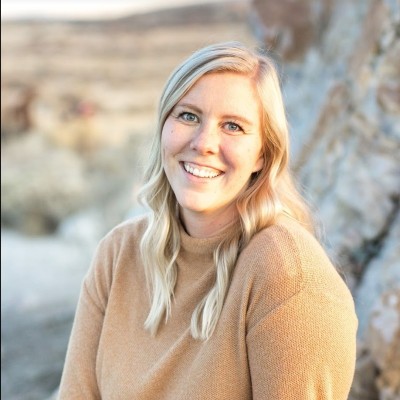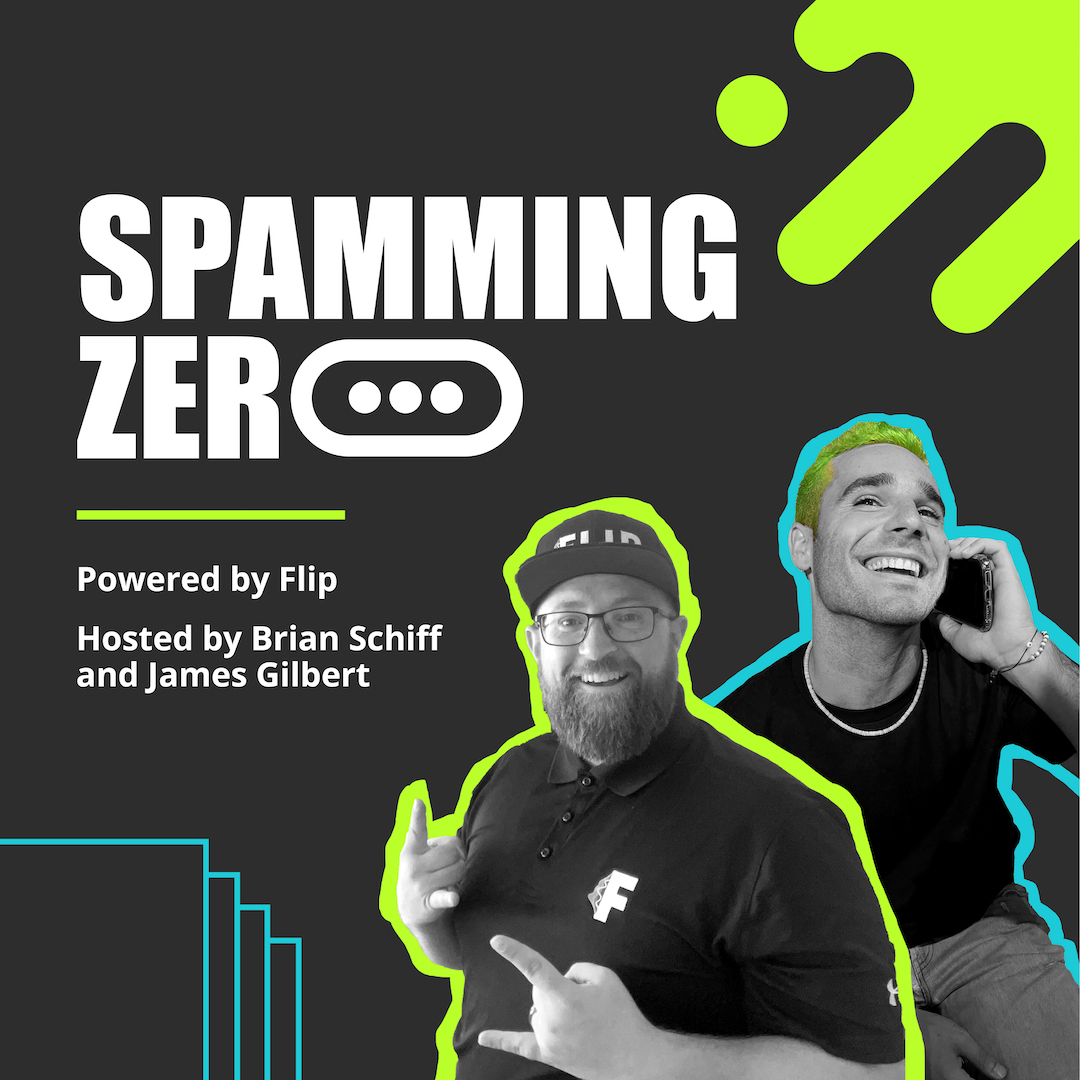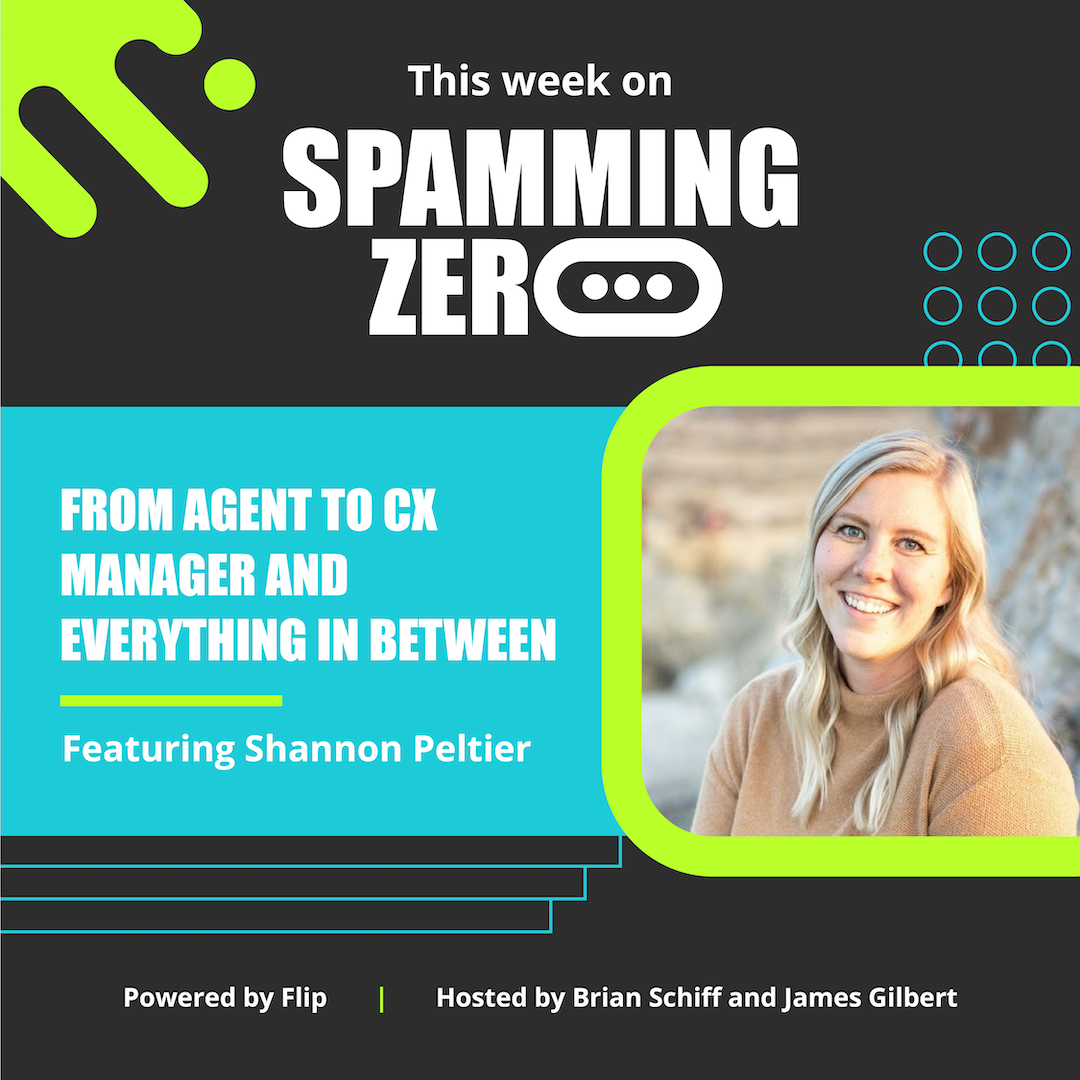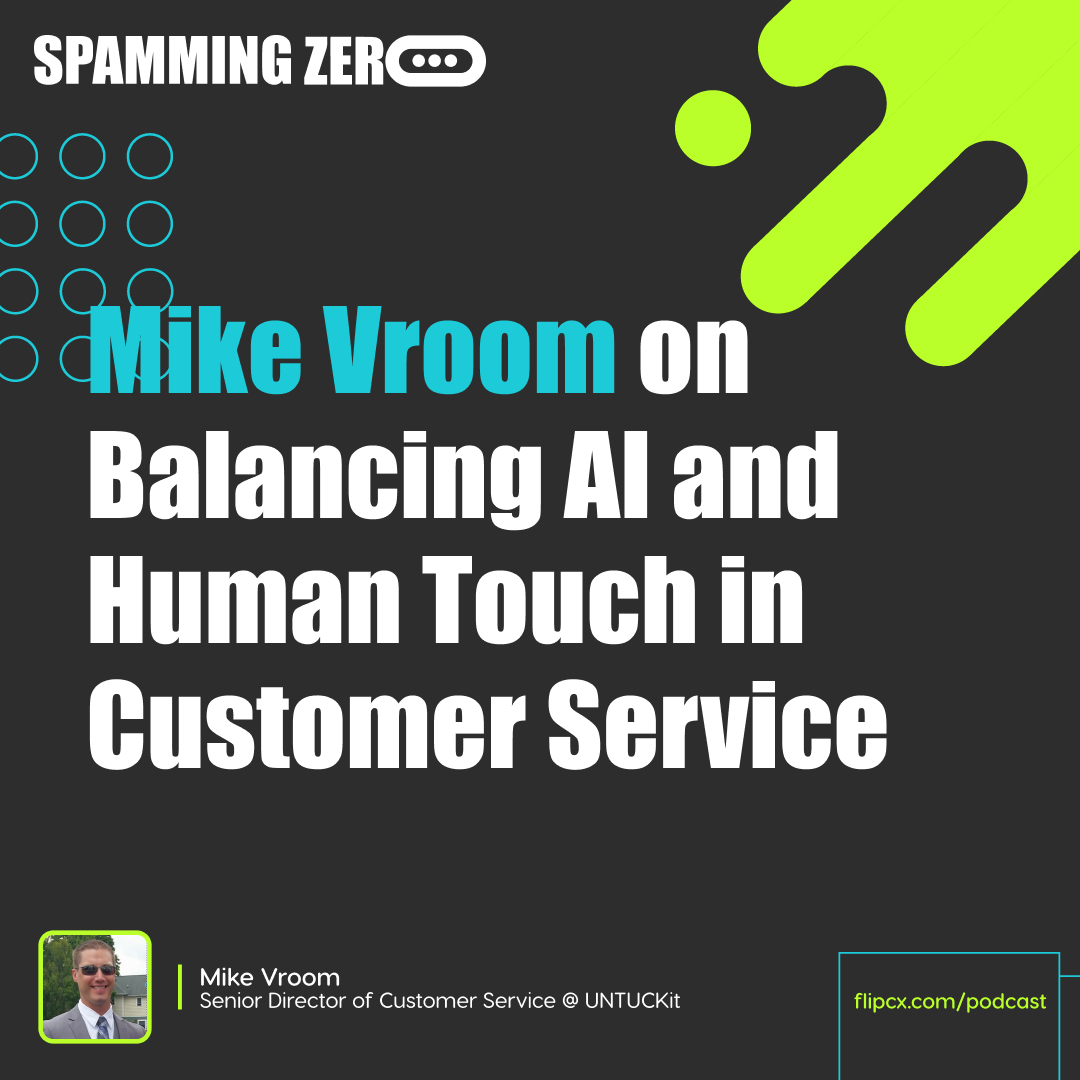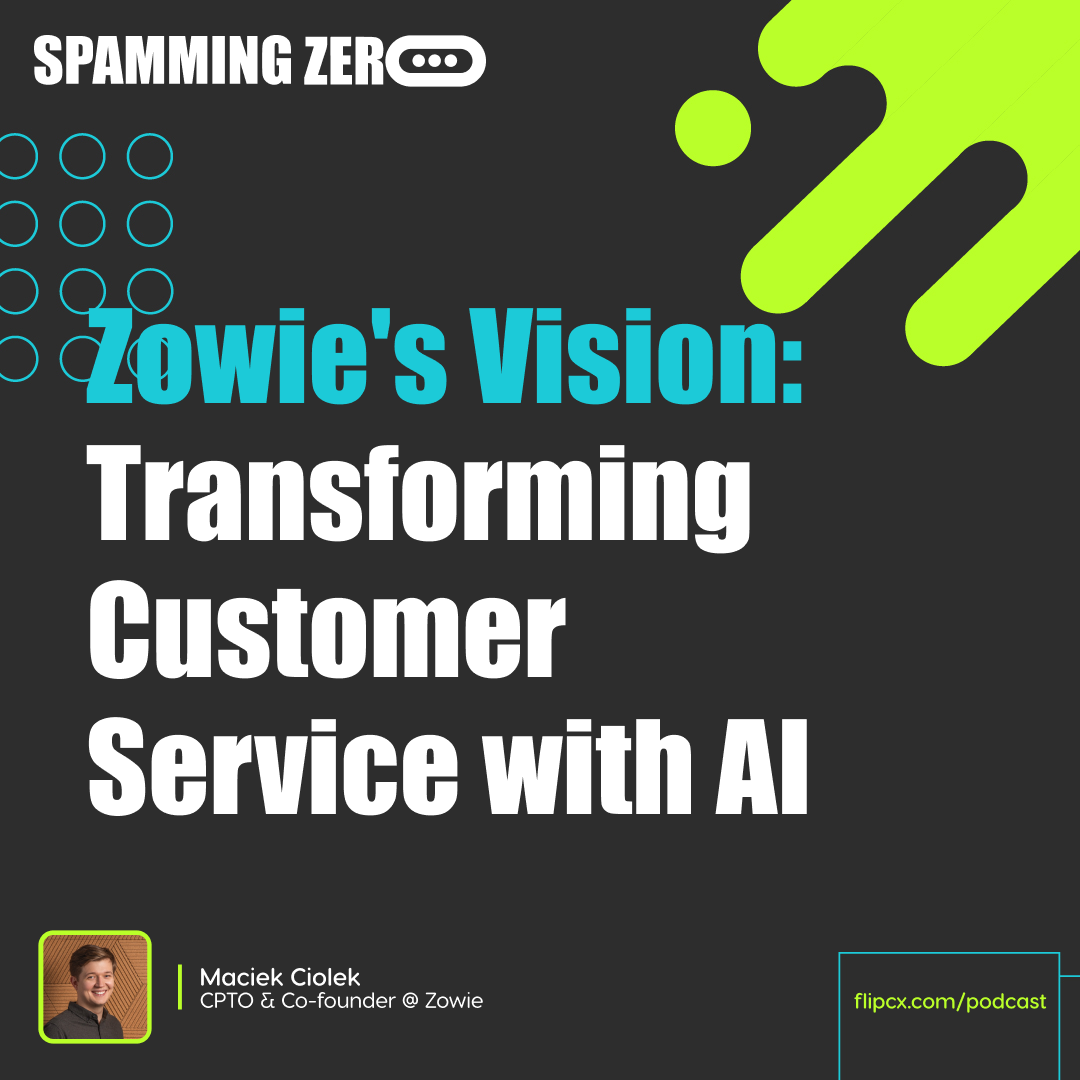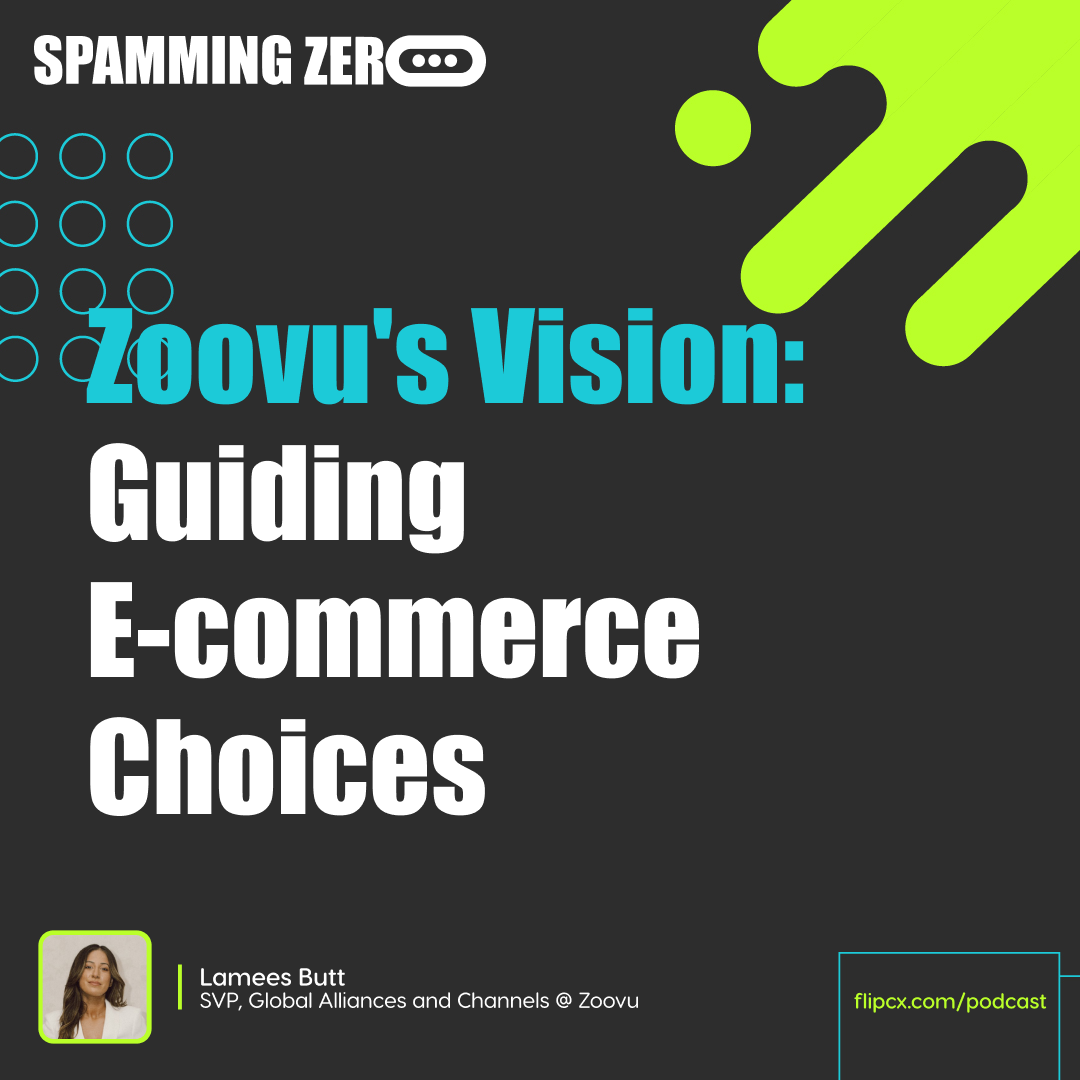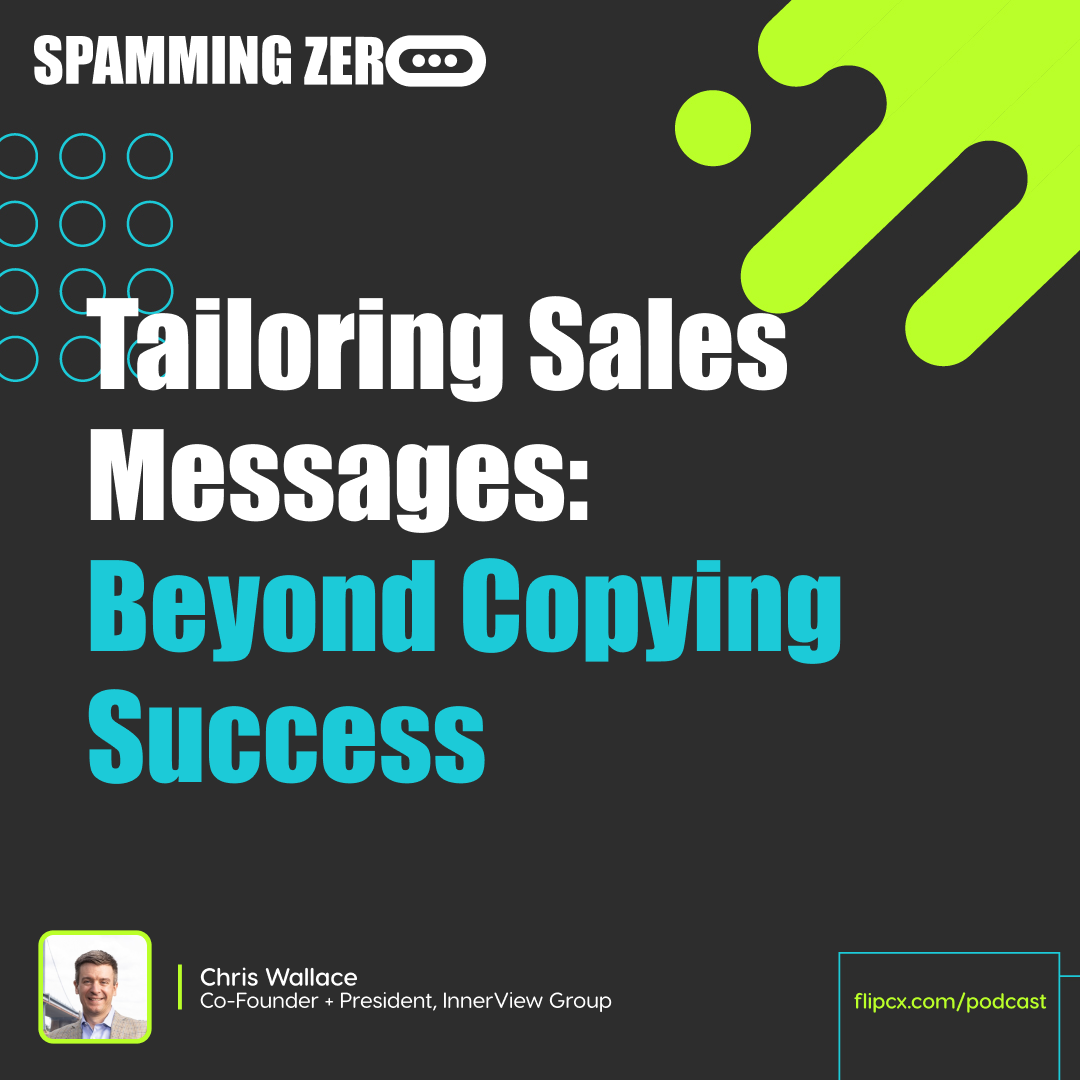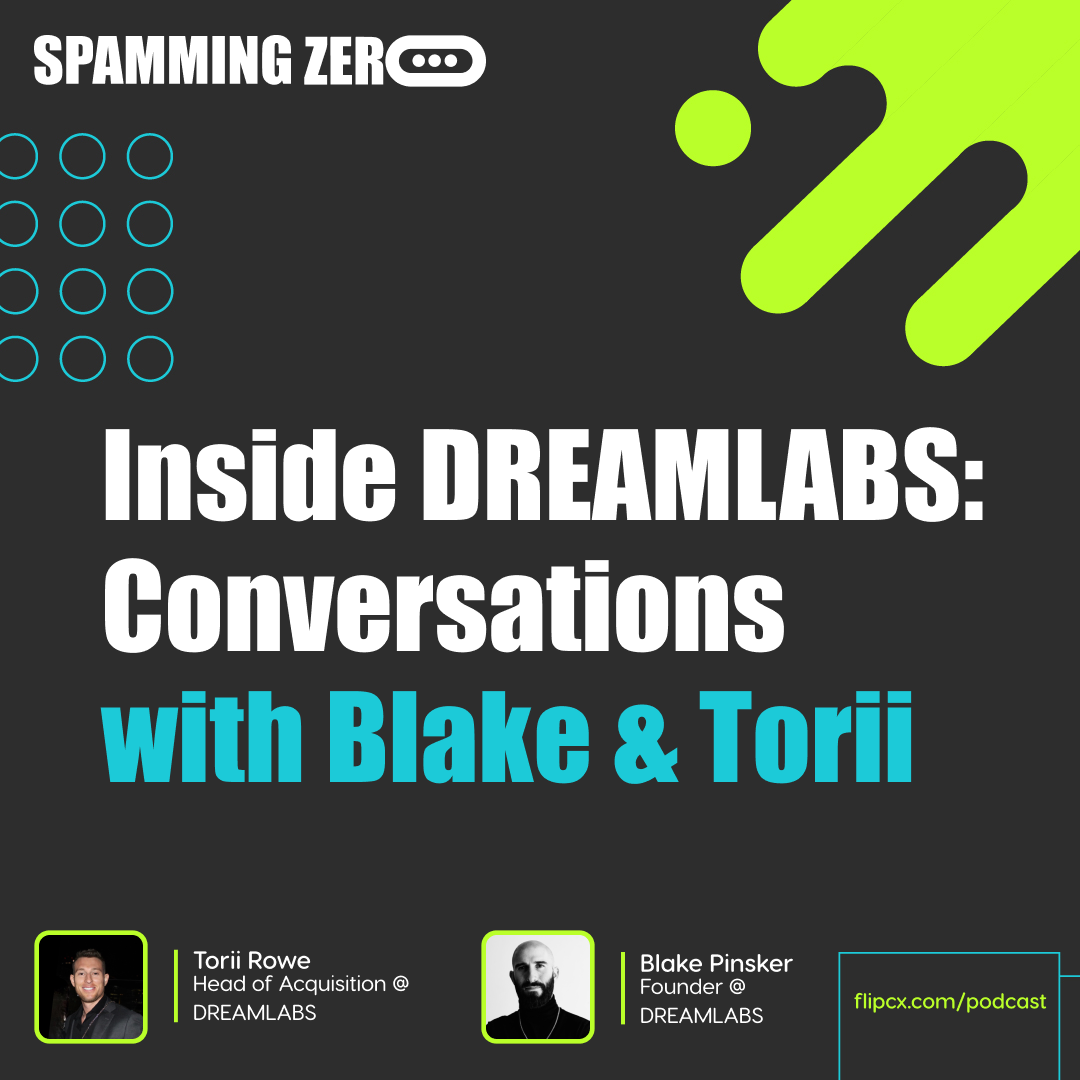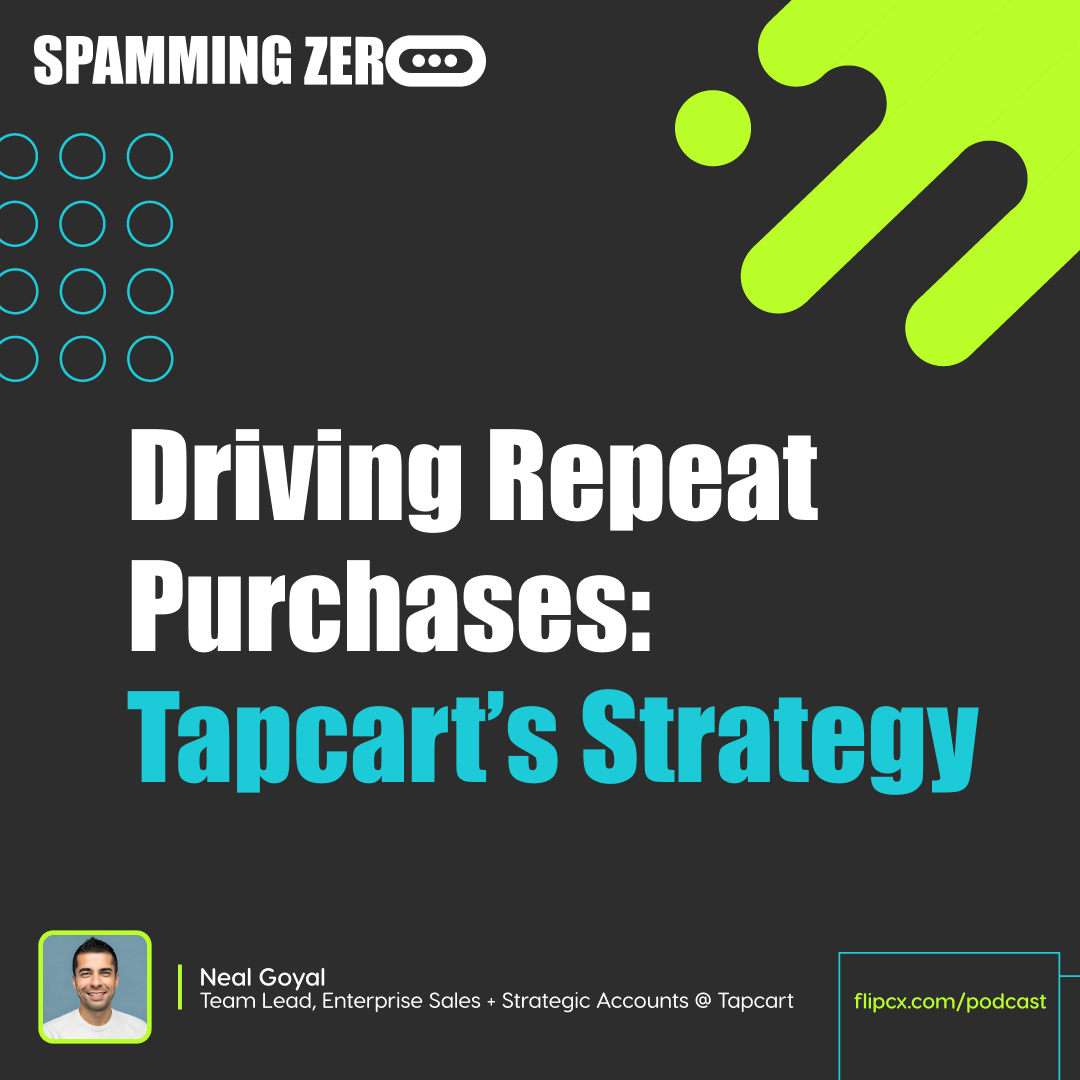Episode 23: From Agent To CX Manager, With Cotopaxi's Shannon Peltier
- 0.5
- 1
- 1.25
- 1.5
- 1.75
- 2
James: Hello, everybody. Welcome to another episode of Spamming Zero. We're excited about today's episode because we are going to be joined by our brand Cotopaxi. If you are not familiar with them, I highly recommend you look them up. They are people for the world. Super excited because I am also a fanboy of their products. I am a huge fan of the person that we're going to have on, Shannon Peltier. You'll hear me pronounce her name wrong, which I get wrong totally in the very first part of the episode, which sucks on my part. But I've learned over the time. It's really awesome because we unpack this idea of being a frontline agent, which she was and working your way up into a CX Pro who oversees the strategy. She oversees the CX strategy at Cotopaxi. She's the CX manager there. So what does Shannon think when she calls support? She says she immediately feels frustrated. But because she helps manage people that also deal with these types of calls, she empathizes with them. And let me just say this, Cotopaxi is a brand that produces products that are for those that love the outdoors. Very unconventional look and feel. I love their travel bag. Actually, it's the thing I take on all business trips that fits everything. You'll hear me talk about that. Absolutely love it. Plus, it's a local Utah company, which I'm, as you know, a native to. Shannon's also local to Utah. She's a mom to a four year old and two puppies. Awesome. Also, going through some DIY projects. So, that's a little bit about her. In her spare time, she's working on her fixer upper. She is a volleyball coach and more on that. Stay tuned. We'd like to thank our current sponsor of the month Aircall. Aircall. io. Go check them out. Love what they do. They also just reached a hundred million in revenue, which is incredible. We partner with them. They're a big part of our ecosystem. Aircall is a cloud based call center and phone system of choice for modern businesses. A voice platform that integrates seamlessly with popular productivity and help desk tools. Aircall was built to make phone support, easy to manage and accessible, transparent and collaborative. Aircall believes that a great conversation is the most powerful way to communicate with customers, prospects, candidates and colleagues. We tend to agree. They are as equally invested with voice and sound as we are. I'm James.
Brian: And I'm Brian.
James: And this is Spamming Zero. All right everybody, welcome to the show. We got Shannon Peltier here.
Shannon Peltier: Shannon Peltier.
James: Oh that's right. Okay. I'm sorry. That's my bad. I'm really good at pronouncing names wrong as we've learned on this podcast. Shannon, give our listeners a good feel for how you got to where you're at today, career wise.
Shannon Peltier: Yeah. So I currently work for a company called Cotopaxi and I will be with them for four years this November which is the longest I've ever been at a company. That's been pretty cool. When I started, they were about five years old into their journey of being a company. But it was actually a really cool opportunity. I was a new mom. I had just quit my full- time job to be a stay at home mom and decided that sadly that life wasn't for me. It was very difficult to just sit home with a baby who I love her so much, but, man, was she hard? She was so hard and my husband-
James: Can't wait for her to listen to this.
Shannon Peltier: Oh my gosh, she's only four, she's got years, she's fine. But anyway, my husband would come home and talk about things he did at work and I just really missed that connection. I missed that team environment. I missed having something that brought me to the outside world. Anyway, I wanted to work from home. So it's pre- COVID, right? So work from home jobs where you could be a transcriber or you could be the cold call sales people. That was basically all that was out there. And I had an old college connection of my post on Facebook about this unicorn of a position, which was work from home remote, 1 to 30 hours a week, do what you can type job. And I was like, that doesn't feel real. No job would hire a customer service rep who can't do phones or because I'm, I just couldn't do live coverage with an infant in the room. Anyway, I reached out to her, I was like, Here's my situation. Do you think I should apply, right? I had known Cotopaxi because I actually coincidentally participated in their first ever Questival when they launched the brand. I participated when I was in college. So I was very familiar with the brand from their inception and just had followed their journey. So I was like, I love the brand, I love the outdoor mission. Anyway, long story short, I got an interview. I went in and it was the first time I think I've ever been fully transparent in an interview where I was just like, this is what I can offer, right? I'm a new mom, I'm figuring out life, I've got nap times, I've got bedtime, I've worked in customer service for years, I know how to do it. I just need a chance. A chance to prove that this could work from home. And they gave it to me, which was very shocking in my brain to be picked even when I was so vulnerable. And I remember I started this job, I was remote and again, I had the super flexibility of working... I could work one hour a week or I could work 30 hours a week. They were just drowning at this point and they wanted any sort of backend help that they could get. And I just remember falling in love with the immediate trust that I had right from the get go. I was very vulnerable in my interview and this company chose to pick me even among hundreds of candidates. And I was like, I'm going to make it worth it. I'm going to make sure I do everything in my power that when they look at my area of work, they're not like, eh, yeah, it's not worth the company, let's slice it. And four years later and I'm still here. It's been pretty wild. .
James: Doing an amazing job.
Shannon Peltier: Yeah, it was really cool. I mean kudos to the team as well. It's not on me. But it's been so fun to grow in this company and have the opportunity to help develop it as well. Just from where we started, we've had multiple different teams. About a year in, I was given the opportunity to go full time and again, I was very transparent of the fact that I'm, I can't do a 9 to 5. I can get the jobs done, I can get the projects done, but I cannot work those dedicated hours. And they didn't even flinch. All right, that sounds great, here's the opportunity, take it if you want it. And that's when I got to lead our remote team. So I became the head of CX remote team at Cotopaxi and then a year later I was bumped up to the CX manager. So now I oversee our support and our success team and work directly under our director and it's pretty incredible to just... I don't know, it's very weird to have a company invest in you and I invest in it, right? It's always felt like an equal partnership, which has been very rare to me.
James: So I love when brands, I guess I should say businesses in general, take the approach of employee first and realize that people's schedules are oftentimes not exactly what they anticipate as a business for people to work. Those three or four projects, if they are done and they're done efficiently with the outcomes that we're looking for, you do it when you can do it. And I love when brands take that approach because I do think that it is interesting to see how many businesses out there don't think that way and really hit hard with the 9 to 5 thing, especially in a role like this. I think it's fascinating that they started you in this role. And here's the other thing, it's even more rare, and I know this being a Utah native, it's even more rare of a role like that coming here in Utah. Those just don't happen. So I just find that really interesting and I do think more brands need to be doing stuff like that.
Brian: I think it's awesome. I think one of the best parts of remote work is that it forces people to judge output and not input from a leadership and management standpoint because there's no way to judge input anymore. And it was something that was lip service in a pre- COVID, in office world. Everybody would say, Oh yeah, we're flexible and we're only looking at the output. But then, everybody was keeping tabs looking around the office, this, that and the other. So I think it's one of the many fantastic benefits of remote setups.
James: I'm genuinely curious, what is the biggest challenge that you feel like you've faced in moving from more of the agent side into managing the actual strategy of customer experience?
Shannon Peltier: I think most mid- level managers would agree with this, right, and I know it's a hot topic right now, but typically promotions come because you're really good at what you're doing. They're like, Okay, who's performing well? Who's output is incredible? Let's promote them. So then you get into this leadership position and now you're starting to lead and manage the people who are doing the job you were just doing. But now you have to learn a whole different style of work because it's managing people, not process. I'm real good with processes. You want me to write policies, SOPs, whatever, I'm on it. But when people come to you and they have questions or concerns or life events or things that maybe prohibit them from doing their job, it's like how do you show up for these people? How do you now manage their career roadmaps? How do you make sure they're achieving and getting the fulfillment that they want? Because for me, I know I've seen it in a lot of customer service, it's high turnover. It's usually an entry level position. Somebody comes in for six months, they either love it or hate it or they're not getting where they want so they're out. But biasely, I would say customer service has one of the most rigorous onboarding processes in a company. You have to know so many processes and people and you're dealing with the customer and if you don't have a customer, you don't have a company. So it's like you're the face of that company and you have to have the right people with the right training and the right soft skills who get the answer in the right amount of time to the customer so they're not frustrated. But also if it's a disappointing answer, how do you deliver that? And then to be the person that has to manage and train and hire and onboard that, it's very daunting to just be like, Wait, you picked me? Wait, I can do tickets, but how do I manage the people who were doing the tickets? And that was the biggest hurdle was just I love people. That's why I work in customer service. I love working with people. I love that interaction. But now it's weird to be a step away from it. So I get to hear these experiences, but now I have to coach through it or be the person who only gets the escalated calls where they're like, I want to talk to your manager. And you're like, Cool. But I think that was probably my biggest hurdle was that almost imposter syndrome of, why did they put me here? Right? Yeah, I'm good at my job and I can give tips and tricks of how to be efficient in the role, but when somebody comes to you and says, I want to grow in this company, and all of a sudden you're like, inaudible. Again, I grew in this company, but sometimes it's hard to pinpoint how you even got to where you got. I think for me, I attribute a lot of it to luck and good timing when realistically, I'm sure there were other factors in it, but I'm, no man, I just got lucky. I was in the right place at the right time and it worked out. But that discredits a lot of the hard work and initiative that I put in into my own job. When I got in my leadership position, I just managed the team as I had known it. We kept it the same, then we started having people who wanted to grow. And it became very apparent that I was like, we are not structured to scale. We have been in such a reactive position for so long where we're just trying to bandaid and triage and fix what we can, how we can. And we'll come back to it later. But again, it's like we're burning out the people who are putting in the time because they don't see growth, they don't see fulfillment. And so that really became the shift in my mind where I was like, if we want to make sure we don't have continuous turnover in our agent, how do we make sure they feel invested in and they feel seen and heard and have a plan and they can see I can grow in CX or I think a huge benefit is filtering CX agents into the company further. So other entry level positions; into marketing or into finance or into design or anything like that. There's so many amazing opportunities and it's like if you can get people who come from CX to then work into your bigger company, that voice of the customer travels internally and will always be represented now on a larger scale in those departments.
James: I love what you said. I don't think I've ever heard anybody put it like that. Hiring even entry level folks that are in customer experience and for lack of a better way of putting it, that dropping them in different departments to own that. I think that, that's a really fascinating way to look at it.
Brian: So you've talked a lot about the mindset and responsibility shift going from being an agent to being in this management role and understanding the brand obviously, and then also the life of the agent and thinking about how to make it a good experience for those people and continue to grow those people. So I think that that speaks to a lot of what your mindset has been and the strategy. I'm curious, what are the other things that as you've taken on more of a leadership role at Cotopaxi, have been those top priority items? One of the beauties and the challenges of customer experiences that it can go in limitless directions. There is an infinite amount of projects that can be done. How have you gone about prioritizing and what are some of the things that you've done?
Shannon Peltier: That's a great question. And like I said, it really hit us probably two years ago that we were in a scalable situation. So we redesigned our whole team. We created this whole different tree of how people could grow and develop and different opportunities. But even then we were still facing the big challenge of we had people on our team, we were mixed with full- time and part- time agents. So our full- time agents typically were tasked with part of their day working in the queue and helping out customers and part of their day managing these projects. We really were trying to make that shift from a reactive customer experience to a proactive customer experience. So how can we find those efficiencies and find those opportunities to have customers have that self- help option and for our agents to have that self- help option. I don't know if you guys... what communication you use, but we use Slack and man is it so distracting to always just be like ping, ping, ping from Slack and you're pulled from every task and it's just like you can never give a full go at any project because you're pulled into a different fire when you're in this reactive state. So last April, we need the switch to where we broke our team in two. So we have the umbrella of CX and like I mentioned, we have our support team and our success team. And, our CX success is a little bit different than what I think traditional business is, but they're streamlined and focused on creating efficiencies in our customer experience support team. So their whole first year of inception was literally to audit, edit, and find those gaps in our platforms that we were currently using. So we had scratched the surface on some of them, but there were so many different things that we could implement and change that would then help our agents be better at their job and so more confident in their job and not have to Slack a question every time they had it because we now have a whole database built out. And then in this year, we've really shifted to now focusing on what we're calling our customer journey and our voice of the... we call it Voice of the Globe Scout. We're calling our customers Globes Scout. So we Voiced of the Globes Scout and two years ago we implemented a meeting that was called Voice of the Customer, where our CX team once a month presents to all the stakeholders in the company, just what we are hearing from our customers. We pulled data from every platform that we're using, whether it's social media, whether it's our inbound queue management, whether it's Facebook, whether anything, right, phone calls, and we simply say, Hey, we ran this promotion this month and here was the outcome. It really gave us the opportunity to meet with all the stakeholders in the company and just collaborate on, again, pain points of the customer. Without a customer, you don't have a company so you've got to listen to them. And I think oftentimes CX is seen as that little brother in the corner. They're just managing the tickets and the whiz mo's and all those things. But there's a lot we can learn when we listen to our customers. And yes, the customer is always right, but sometimes their concerns don't need addressed. You get people coming from all walks of Earth that are like, You should offer this. And it's like great idea, but probably not. But for us, I think that has been the biggest... I don't know, it's just been so incredible to see what this success team has been able to unlock for our support team. I often think companies will expand their support teams simply because they need more head count. They're not investing in their systems and so they're working with 10% of a system they're paying for and they just hire more and more people because the demand is getting more and more. Where we've been able to maintain lower than 10 agents on our support team for the past probably three years. And I love the small intimate team. Yes, the workload's a little heavier, but if we can create the right efficiencies in our programs, take away some clicks, take away some decision fatigue, then their job becomes easier, they're more satisfied. When they bring up a concern, they know that there's a pathway for us to take it and communicate that with stakeholders. It doesn't fall on deaf ears. We do a tracking and accountability of it. And I just think that confidence, that enabling confidence is so huge as an agent to know that your voice is heard. Again, an entry level, you know might be a college student, but for a lot of our agents, this is their first ever job. And I just think that confidence should be taught from a very early age that you do have a voice and the people you represent matter. And hopefully our customers then see that, right? They know that their voice is being heard and represented in our company. And I think just splitting off those two branches has been our biggest win for a while that's made a huge impact for us.
James: One of the biggest trends right now in social media is some of the stuff that happens in TikTok. There's a lot of agents out there just persona'ing... I guess, I don't even know if that's a word, but whatever, we're using it and acting out what's happening in their day to day and it's like, holy smokes, I've watched some of them. I'm like, whoa, the stuff that people deal with. So here's my question for you. You mentioned the fact it is the number one job that it's quit. Quit or unfortunately in most, in a lot of cases too, it's also cut. So it's a double edged sword there for people that are in these roles. What's your hot take for those that are in a role like this to, one, not get burned out or just what's your hot take to ensure that that role isn't cut and is remaining prominent?
Shannon Peltier: I think in my brain the biggest win, it's something that my director says often and it's become a big life mantra for me where it's simply just seek to understand. I think that's a big reason of how I ended up where I am. I think for me, I just owned what I didn't know. And so again, I came into CX where it was very reactive. We were just in this state of panic, panic, panic. And it started as me just asking questions about our return process. I was like, Hey, does anybody understand why we do the way we do this? I was fortunate to have a leader who didn't take offense to me asking questions and he was like, No, I don't, research it and let us know what you find. So I was given the opportunity to reach out to other stakeholders in the company and simply just say, why was this policy put in place? And a lot of the times, again, in a startup or any company, we get in our lanes of comfort. We're doing what we're doing because that's the way it's done and we don't really question it or reevaluate it. And as any company grows, you have to audit and edit that. You have to figure out what's going awry. How many times as a leader do I get asked a question and what's the first thing that I do? I Google it, right? I'm like, I don't know. But, I Google it and then I hand it back. But at the same time, empowering my own agents, when they ask a question to do the same thing. I actually don't know that answer, but here's some people you can reach out to, to source some feedback on that or Google it, I don't know. And you work collaboratively to figure that out. But I think again, it just comes down to confidence. So many customer support positions are scripted. They are stay in your lane, they're put in a box. And for a lot of companies that's just how they operate. But I think to grow and develop any sort of CX, you have to give that autonomy and trust to treat your agents as people. And then your agents have the freedom to treat your customers as people. You have to make sure you're hiring the right people who are comfortable in that. Because a lot of people I think in customer support, love that good soldier rule, tell me what to do and I will do it, right? I want the mindless work. But oftentimes I think that's where burnout comes. When you just get bored, you're done with it, you're over it so you leave or your metrics aren't where they should be because you have no initiative to grow or push yourself. So like you said, sometimes the roles get cut, but I just think you have to allow people to be people in both sense of the words. So for my agents and for our customers, we have to accept them and listen to them and try to adapt and react to the best that we can.
James: If I had to make a guess as a fan of you all on maybe why your leadership team does see its value, let's unpack the vision for a second, people of the world right? Now, if I'm a CMO promoting that vision, I know without a shadow of doubt the best way to promote that vision of people of the world is having people of the world get together and talk about it and be advocates. And so in order to do that, you have to create really good experiences that they'll talk about. And you have to create experiences not just with the delivery of the service of the product, but the product itself has to create an experience, which is what it did for me. We've talked about that backpack I take everywhere and it creates a crazy experience for me because I can take my entire podcast set up because there's so many compartments in this backpack... I can take the entire thing and nothing is broken. I can make sure that it's all safe and it creates an experience of travel for me. And I think that the products that you all have, they do that and they tie to the need of the people of the world that love to be outdoors and love to travel and do the things that are necessary. And I think that the vision that the company has around that has allowed the leadership team to let that flourish. And I think that's an important distinguishing factor that brands could probably piggyback off of the example that you all have set. Because oftentimes vision that is set at the highest level, and Brian, you and I know this very, very well, but vision that is set at the highest level is not always executed on to the level of, okay, this is actually how our brand is represented now. And I think that if I had to guess, that would be my guess as a fan and customer of y'all is... I didn't hear about Cotopaxi... I even say the name wrong of your brand, but nonetheless I didn't even hear about them through your normal means of marketing channels. How I heard about them was through people that I know do a bunch of hiking, backpacking and then we found out about them as a local Utah person. So, that amplified it even more word of mouth. And so I just think that, that's a big thing. I mean I've seen now people that I trust and admire that are also big into outdoors... Posterior has stuff all the time on social media and advocate for it. And I think that, that's the evolution and outcome of the vision coming to full circle of why I think it's so important.
Brian: And then the other thing that has to have just come to mind a little bit here, but I agree with you James, from a top down standpoint and a vision and culture standpoint, and then really that does then guide the people that are brought into the organization, but there's also an element of you came in and you were motivated to have an impact and you were asking these questions and you were coming to the table with these ideas and with this data and you were pushing for these things. And then all it takes is one domino to fall and there to be one light bulb that goes off, one win that happens that maybe it leads to a big jump in a core metric on the support team or maybe it leads to a change in a policy that everybody sees as obviously better in some other department of the business. And then it gets very easy in any role to give more and invest more behind good people and good teams.
Shannon Peltier: I love that. Think you're spot on.
James: I always think it's interesting too because when people are building their careers... So this is for all the people out there that want to try to build a career like Shannon, let's unpack what you did. Okay, number one, you asked questions to understand deeper. Number two, you took on more workload to show that you could impact it and also take it to the next level. And I think these two things are very simple things that everyone could understand. This happened actually just the other day, I was in a marketing community and there was a question that was proposed to all the CMOs in there and they asked, What is your highest level of advice that you would give people that are trying to become a CMO that are maybe a director or a manager? And my first thought was exactly what you did. You have to show that you're a leader before it's on paper. Meaning before your title changes and before all that you have to show that you're a leader. And I break it down into similar, definitely your two, but also I add a third and that's like, I want to see that people are willing to follow you, that they advocate for you and that they trust you at a level that I don't have to go and ask them and say, Hey, what do you think about Shannon? Instead, it's proactive. They're coming to me and being like, Oh my gosh, I love Shannon's leadership. I love what she's doing. I love the coaching she's providing. That's what I look for. And that's ultimately how I became a CMO and growing the ladder. I started off not as a CMO. So there's a path for everybody, but I think that these are some tangibles that people can take away. So if you're an agent out there and you're listening to this call, which would be awesome, or this podcast... I called it a call. Weird. It's relevant, it's sort of the same thing. But if you're listening to this, it's very relevant to your role because what Shannon did is she started off exactly where you're at. She's giving you a path, she's telling you how she got there. And this is, I think true across almost any area that you would grow a career is having these tangibles that just they need to become second nature to you.
Shannon Peltier: Yeah, I think that's spot on with what you've said. And to add a little bit of flavor to there, I think the biggest part that helped me was that I didn't come in with the big picture in mind. I didn't come in hoping to become the CX manager at Cotopaxi. I didn't have this big goal. Of course, I want opportunities, but I think every other job, I've come in wanting something and then I either get frustrated or disappointed or it's not working out the way I want and that creates my own unhappiness in my role. And then I find a way out eventually. But I think coming in and just being happy to own my role and own my responsibilities to the fullest. So maybe it's like, Hey, you gave me this chunk of what I'm supposed to own and I'm going to take on a little bit more and do more. But at the same time, not being afraid to have conversations about your career. I think a lot of the time agents, any person gives the power of their career to leadership. They'll bring it up, they'll talk to me where it's awkward or uncomfortable and it shouldn't be, right? It's your own career. And I think we have to be honest at times that sometimes you're at a place that's like, this is great experience that I've had for a year, maybe two, but it's time for me to move on to somewhere else. The opportunities of growth and development aren't here anymore. I loved what I've got here. At Cotopaxi, we try to create what we call a career highlight. No matter the time that you give to Cotopaxi, we want any time on your resume for you to look back and say, That was an awesome opportunity for me. Whether that's six months, six years, we don't know, but we want to make sure that what you're getting out of it, you leave a better person, a better employee, everything. But I just think it comes from that ownership. A lot of people come in is like, I do want to be the CMO and I want to be that in the next five years. And I think that's great. We should have goals, but that shouldn't mean that you diminish the role that you start at. Own it, be the best at it, right? Expand it, see what you can do with it, build it, create it. And then you can come to a manager or a leader and say, Look what I've done. You asked for this percentage, I gave this percentage. Then, that becomes clear too. If your manager's like, Oh, cool, I'm not going to do anything about it. Maybe that's not the organization for you, right? Maybe that's not the leadership you want to be involved in. Maybe you do need to take it to a different company. But it's just like you have to own your role and own your boundaries too, right? Own your own value and what you're worth.
James: I'm a little too competitive by nature and some of the roles that I was in really early on, I was on the phones, I've served as an agent, I've served as a cold call sales representative too, I've done that and I just was too competitive. I hated losing. At the end of the week, if I lost, ooh, I was so mad at myself that I couldn't beat the person that was next to me making the same amount of calls. So I also think there is a little bit of this competitive nature that I think that helps you have some of that desire to learn those things. Shannon, we are at time. How do you feel about this week's episode?
Shannon Peltier: I loved it. I don't know, I love how natural it felt just to chat and hang out. I appreciate you guys being willing to share a little bit of my story. I think that's awesome.
James: Thanks for being on the show. We will have you back no doubt about it, especially after I get this new gear that I'm going to have to tote and talk about more.
Shannon Peltier: Happy to chat anytime.
James: Thanks for joining us on this week's episode of Spamming Zero. If you have not yet subscribed to the podcast, please do so. And if you have any questions or if you want to hear a topic that you have not heard, Brian and I are your people. Reach out to us via LinkedIn or whatever you want. You can send us an email to, I guess if that's really the route you want to go. But give us a topic that you want to talk about and we will do that. So see you next week.
DESCRIPTION
Here at Flip, we’re huge fans of ambitious CX folks (ya’ll run the world!) And it’s fantastic to see good work rewarded. But, getting promoted from agent to CX manager is a big transition – and not one that has much of a guidebook.
Luckily, we sat down with someone who has taken the journey and is anxious to help others along the way. Shannon Peltier is CX Manager at Cotopaxi, and she shares top tips on the topic. This week, on Flip’s Spamming Zero Podcast.
What’s Covered?
· Moving from agent to manager: the biggest challenges Shannon faced
· How to best prioritize
· Customer Journey & VOC
· Helping agents avoid burnout and/or cuts
· Creating experiences others will talk about
· Actionable advice for those hoping to follow in her footsteps
· And more
Ready for more fantastic Spamming Zero conversations ahead? Listen, rate, and subscribe on Casted, Apple Podcast, or Google podcasts.
Today's Host
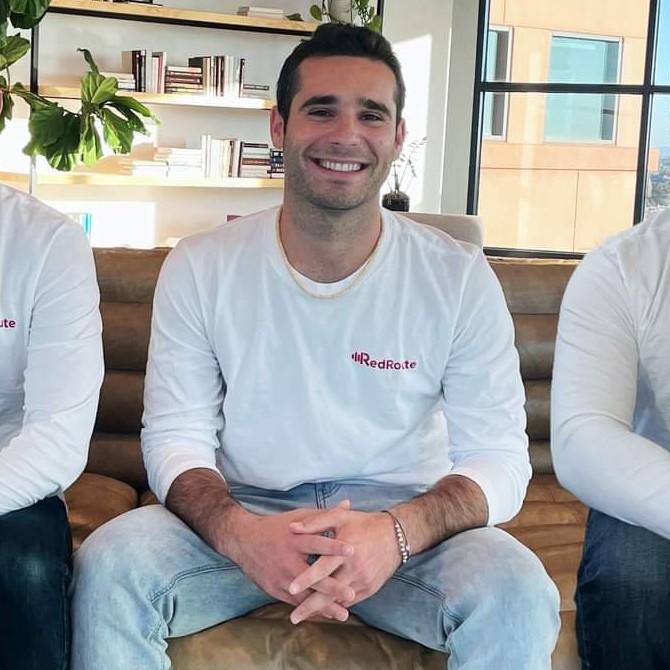
Brian Schiff
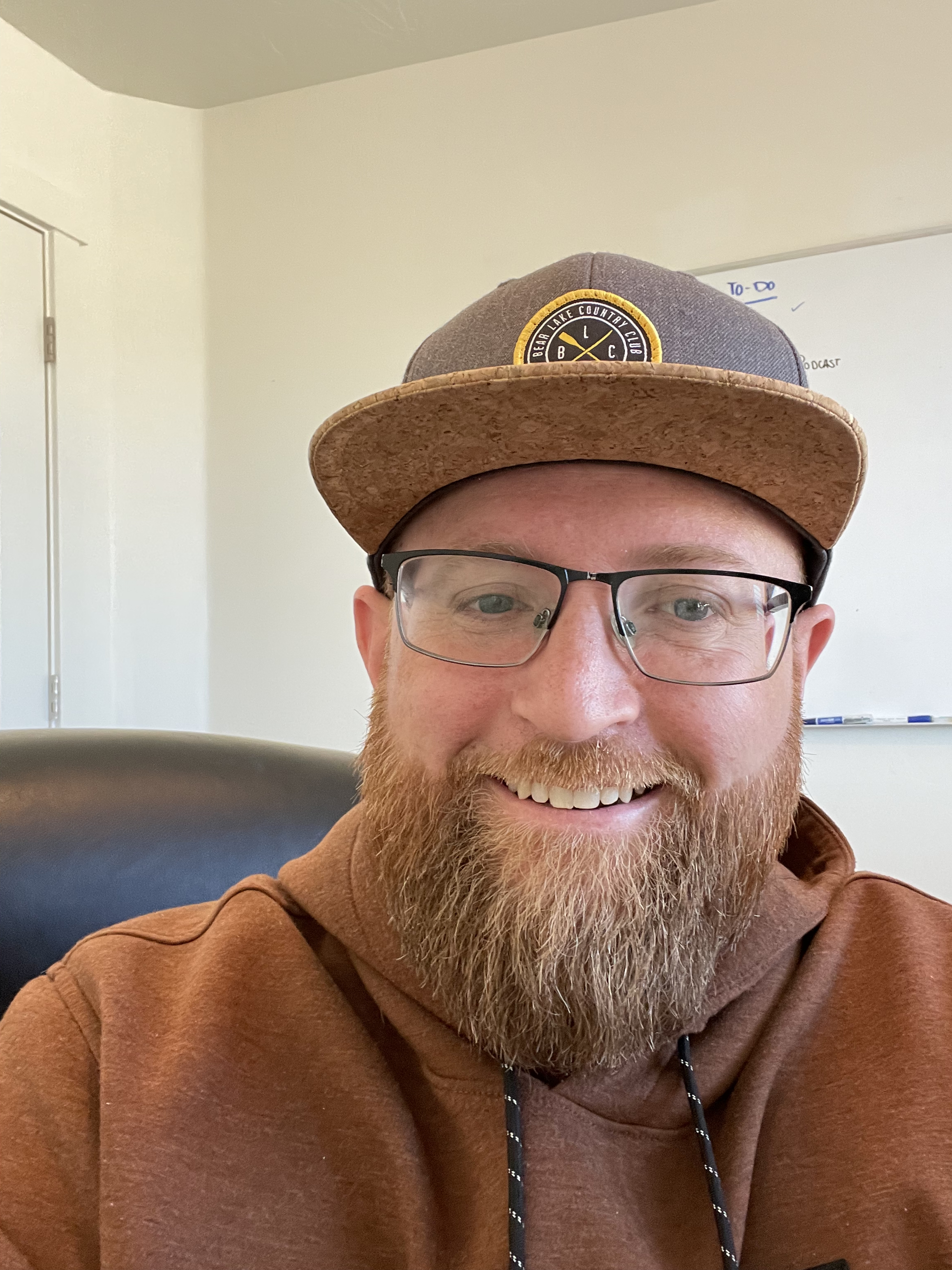
James Gilbert
Today's Guests
